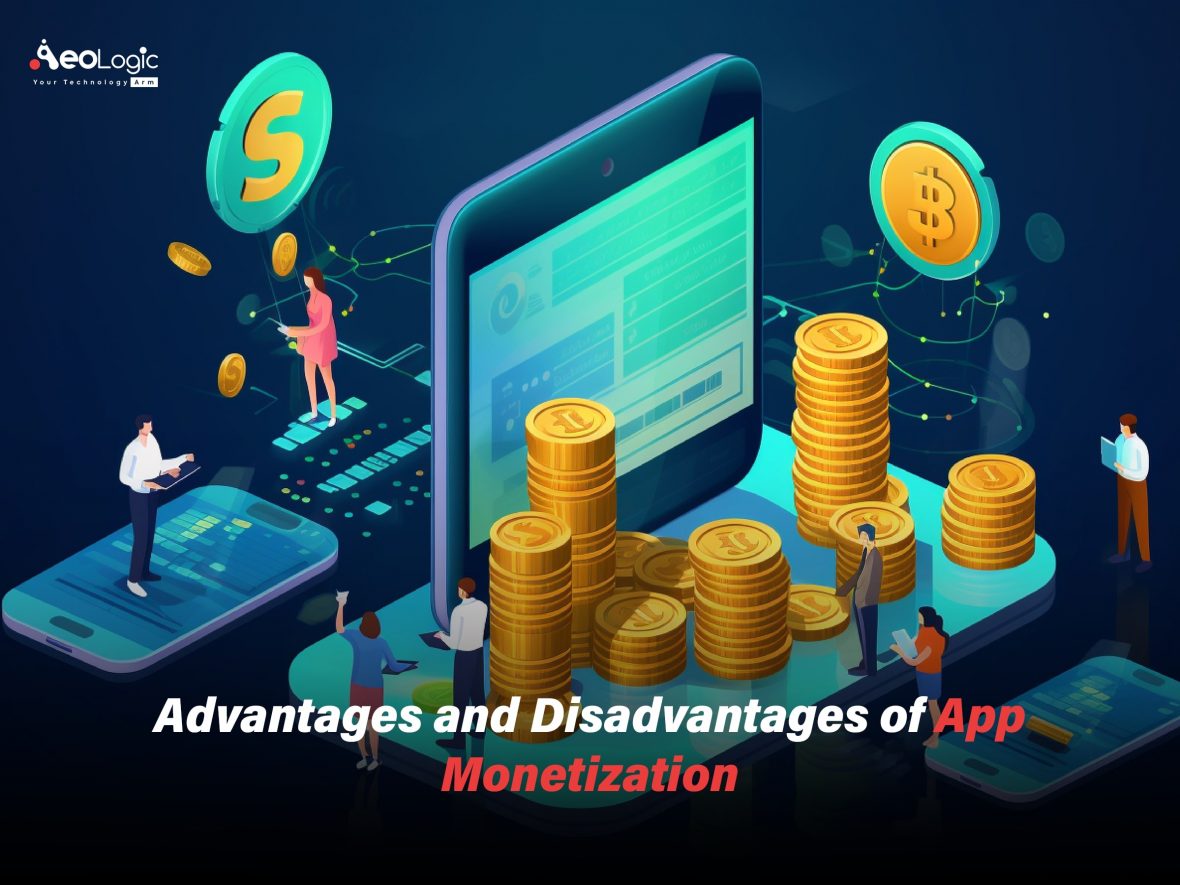So you’ve spent countless hours developing an awesome app that you’re sure everyone will love. Great job! But here’s the burning question: how do you turn that digital masterpiece into cold, hard cash? That’s where app monetization comes in. But wait, it’s not just about slapping some ads on it and calling it a day. There are nuances and strategies involved, each with its own set of pros and cons. In this article, we delve deep into the world of app monetization pros and cons, so you can make an informed decision for your app venture.
What is App Monetization?
App monetization is converting your app’s user base and engagement into revenue. Various strategies exist to achieve this, including advertisements, in-app purchases, freemium models, and subscription plans. Choosing the right monetization model is crucial, and understanding the app monetization pros and cons will give you the roadmap you need to succeed.
Also Read: The Role of Blockchain in Web and App Development
Advantages of App Monetization
Turning your app into a best revenue-generating machine isn’t just about cash flow; it’s about unlocking new opportunities and features that benefit both you and your users. Let’s explore some of these advantages in greater detail.
1. Financial Sustainability
Revenue Generation: One of the most obvious benefits is the potential for revenue. According to a report by Statista, global mobile app revenue was expected to reach $935 billion by 2023[^1^]. If you play your cards right, your app could be a part of that massive pie.
2. Scalability
Reach More Users: As your revenue grows, you can reinvest in your app, adding more features, improving user experience, and reaching a larger audience. This is particularly important for startups looking for rapid growth.
3. User Engagement
Data-Driven Decisions: In-app analytics can provide deep insights into user behavior, enabling you to tailor your app and its features to what users actually want.
4. Greater Control Over Business Model
Flexibility: Having multiple monetization options provides you the flexibility to test and pivot, helping you discover what resonates best with your user base. Whether it’s in-app purchases or subscriptions, you can control your revenue streams more effectively.
5. Competitive Advantage
Differentiation: Monetizing your app allows you to gain a competitive advantage through unique features or premium content that free apps can’t offer. It can serve as a compelling reason for users to prefer your app over others.
| Advantages | Key Takeaway |
|---|---|
| Financial Sustainability | Enables long-term planning and expansion. |
| Scalability | Use revenue to grow and reach a larger audience. |
| User Engagement | Leverage data for better decision-making. |
| Greater Control Over Business Model | Flexibility to pivot and maximize revenue streams. |
| Competitive Advantage | Unique features or premium content can set you apart. |
Disadvantages of App Monetization
While app monetization offers a plethora of benefits, it’s not all rainbows and unicorns. Like any other strategy, it has its drawbacks that developers and businesses must consider carefully. From potential disruptions to user experience to ethical quandaries around data usage, the disadvantages can be significant. To paint a complete picture, let’s dig into the lesser-talked-about side of app monetization pros cons. Understanding these pitfalls can help you navigate the complex landscape of app monetization more effectively.
1. User Experience
Ads Can Be Annoying: While ads are a common way to monetize, they can often ruin the user experience. Nobody likes being interrupted by a pop-up ad in the middle of something important. This can result in reduced user engagement and even uninstallation of the app, which ultimately defeats the purpose of monetization.
2. Hidden Costs
Revenue Sharing: Whether you’re using third-party platforms or ad services, a chunk of your revenue often goes to these intermediaries. For instance, Apple takes a 15-30% cut on transactions made through the App Store[^2^]. While this might seem like a small share, it can significantly add up over time, reducing your overall earnings.
3. Increased Complexity and Maintenance
Challenging to Implement: Tailoring your monetization strategy to your user base can be complex and time-consuming. Some strategies might work well for some apps but fail miserably for others. Implementing multiple strategies can also make the app more complicated to manage, from both a technical and operational standpoint.
4. Ethical Concerns
Data Privacy Issues: Many monetization strategies involve collecting user data for targeted advertising. As privacy becomes a growing concern, you must be transparent and comply with regulations like GDPR. Failure to do so can result in fines and damage to your brand’s reputation.
| Disadvantages | Key Takeaway |
|---|---|
| User Experience | Could alienate users if not done right. |
| Hidden Costs | Revenue sharing with platforms cuts into profits. |
| Complexity | One size doesn’t fit all; it’s challenging to get right. |
| Ethical Concerns | Data collection must adhere to privacy regulations. |
A Deeper Dive into Ethical Concerns
User data is a hot commodity in today’s digital age. Apps often collect data for targeted ads, which is a cornerstone for many monetization strategies. However, this presents ethical concerns that can’t be ignored. With regulations like GDPR and CCPA in place, failing to handle user data responsibly can result in hefty fines and legal consequences. And let’s not forget, a tarnished brand image can sometimes be irreversible.
5. The Issue of Consumer Trust
When discussing app monetization pros cons, the question of consumer trust can’t be ignored. Monetization strategies like ads and in-app purchases can often feel intrusive to the user, potentially diminishing trust over time. Trust is a valuable asset; once lost, it’s hard to regain. Brands should, therefore, exercise caution and be transparent when implementing monetization strategies to maintain a healthy relationship with their user base.
Also Read: The Pros and Cons of Cross-Platform Mobile App Development
How to Choose the Right Monetization Strategy
So you’ve learned some app monetization pros cons, but how do you decide which strategy is right for you? Here are some tips:
- Know Your Audience: Are your users willing to pay for premium features, or would they prefer an ad-supported model?
- Start Small: Experiment with one monetization strategy first, measure its success, and consider adding more layers later.
- Use Analytics: Constantly monitor key performance indicators (KPIs) to understand what’s working and what needs tweaking.
- Evaluate Market Trends: Keep an eye on industry reports and studies. Staying abreast of current trends will give you a competitive edge when choosing a monetization strategy.
- Legal Compliance: Ensure that your monetization methods comply with laws and regulations, especially those related to data protection and consumer rights. Incurring legal penalties can be a significant setback.
Final Words
It’s time to wrap up our deep dive into app monetization pros cons. Understanding both the advantages and disadvantages of various app monetization strategies is crucial for your app’s success and long-term sustainability.
If you’re navigating the complex landscape of app monetization pros cons and could use expert guidance to make the right choices, don’t hesitate to reach out to Aeologic Technologies. With a proven track record in app development and digital transformation, we can help you tailor a monetization strategy that maximizes revenue while maintaining a stellar user experience. Contact us today to learn how we can help you succeed in your app monetization journey.
Key Takeaways
- Financial Sustainability: Monetization offers a pathway to generating revenue and supporting your app’s long-term growth.
- Scalability: As you earn, you can reinvest in your app to make it bigger and better.
- User Experience: Done poorly, monetization can alienate your user base.
- Hidden Costs: Be prepared to share your earnings with platforms and third-party services.
- Complexity: There’s no one-size-fits-all solution; careful planning and strategy are essential.
Choosing the right monetization model is a delicate balancing act, but with a thorough understanding of app monetization pros cons, you’ll be well-equipped to make an informed decision.






